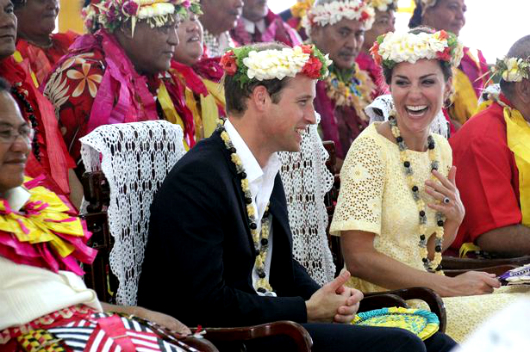Geographic Challenges Lead to Malnutrition in Tuvalu

In the last leg of their Diamond Jubilee Tour of 2012, the Duke and Duchess of Cambridge [Kate Middleton and William Young] made a stop at the island of Tuvalu, joining them in their tribal dances among other activities. Tuvalu is located in the southwestern part of the Pacific Ocean near Australia, is the second smallest country in the world at only ten square miles in area, and is a country rarely discussed in the media.
Taiwanese eco-artist Vincent Huang will soon be unveiling the very first “floating pavilion” there, a pool crossed by walkways. The symbolism behind this pavilion, based on the rising sea levels and ever-changing climate, offers insight to one of the many geographical challenges that the country has faced, which has led to economic instability. According to Huang: “Tuvalu is the smallest national pavilion but we’re dealing with the biggest global crisis. I believe that most people have never heard about Tuvalu but it’s an iconic victim in terms of climate crisis.”
However, the climate crisis in itself is only part of the problem. Tuvalunans rely heavily on foreign aid in the form of imported food products because of a lack of a fresh water supply and poor soil quality. They find themselves less and less able to purchase the food due to rising prices, falling remittances and loss of jobs. In sum: climate change with rising sea levels, little access to fresh water, soil lacking in nutrients, pollution, and climate change along with an inability to afford the necessary imported food has led to malnutrition.
According to UNICEF Pacific Social Policy Specifist Reiko Yoshihara-Miskelly: “malnutrition, in earlier age, it has a long-lasting effect, given that brain development in early childhood could be crucial for children’s later performance in schools and life.” In fact, 1.6 percent of children under five years old suffer from malnutrition in a nation of only about eleven thousand total in population.
However, UNICEF is working to alleviate this problem not just in Tuvalu, but worldwide through a project entitled The Power of Nutrition. Released on the sixteenth of April, the goal of this project is to access $1 billion through partnerships with philanthropic associations through a trust fund with the World Bank Group for the purpose of child nutrition. Learn more at powerofnutrition.org.
– Anna Brailow
Sources: BBC, Daily Mail, Knoema, The Power of Nutrition, Radio Australia, UNICEF
Photo: Mirror
